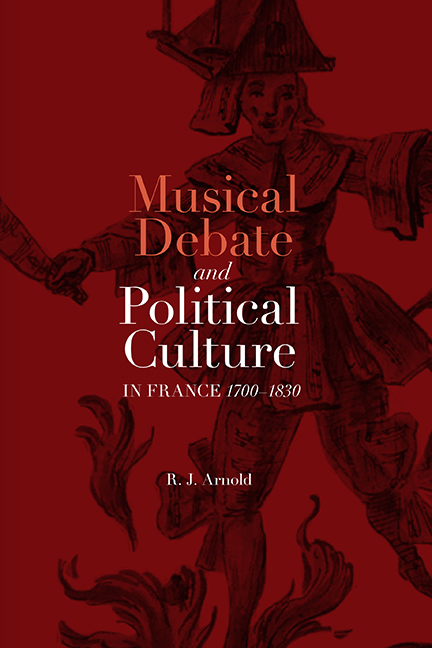Book contents
- Frontmatter
- Contents
- List of Illustrations
- Introduction
- 1 Parallels, Comparisons and Ripostes: The Raguenet–Lecerf Controversy, 1702–32
- 2 Spectators, Satirists and Sectarians: The Ramiste–Lulliste Querelle, 1733–51
- 3 'A Vast Negotiation': The Querelle des Bouffons, 1752–54
- 4 The Spirit of Contradiction: The Gluckiste–Piccinniste Querelle, 1774–88
- 5 A Revolutionary Interlude: 1789–1800
- 6 The End of the Party: New Avenues for Musical Dispute, 1800–30
- Conclusion
- Select Bibliography
- Index
- Music in Society and Culture
3 - 'A Vast Negotiation': The Querelle des Bouffons, 1752–54
Published online by Cambridge University Press: 29 May 2021
- Frontmatter
- Contents
- List of Illustrations
- Introduction
- 1 Parallels, Comparisons and Ripostes: The Raguenet–Lecerf Controversy, 1702–32
- 2 Spectators, Satirists and Sectarians: The Ramiste–Lulliste Querelle, 1733–51
- 3 'A Vast Negotiation': The Querelle des Bouffons, 1752–54
- 4 The Spirit of Contradiction: The Gluckiste–Piccinniste Querelle, 1774–88
- 5 A Revolutionary Interlude: 1789–1800
- 6 The End of the Party: New Avenues for Musical Dispute, 1800–30
- Conclusion
- Select Bibliography
- Index
- Music in Society and Culture
Summary
WRITING in 1755, François-Antoine Chevrier attempted to provide his readers with a balanced account of the ferment that had coursed through Parisian musical circles for the past three years. The miserable condition of the Académie Royale de Musique in 1751 had created a desire for novelty; and the arrival of a mediocre troupe of Italian bouffons – itinerant comic players – at the opera house in the following year was greeted with apparently unanimous approval. But the over-enthusiastic extolling of these bouffons by men of letters, and the stubborn resistance of an element within the traditional wing of opinion, combined to provide a cause for quarrel which expanded and intensified beyond any reasonable expectation:
What emerged from these quarrels, a confusion which disrupted our pleasures and which rebounded on both parties, was that the partisans of the ultramontanists insisted that there could be no such thing as music in France. The Lullistes affirmed that there was none in Italy either, and to prove these two ridiculous theses, they wrote, they pontificated, they attacked each other, and they decided nothing. A peculiar man, born to promote any paradoxes he could get people to sign up to, lined up on the side of the Italians; his strongly written work alarmed the Lulliste party; but since it is easier to come up with insults than arguments, they preferred attacking M. Rousseau to taking him on, and I have seen the rage against him reach such a peak that, in I forget which miserable periodical, some slanderer even criticised him for being called Jean-Jacques …
Chevrer was no innocent: an industrious and ambitious libelliste, he had spent the first half of the decade producing a torrent of satirical prose and he would subsequently be pursued around Europe by the agents of various offended authorities before his early death in 1762. Yet his account of the Querelle des Bouffons conveys a significant impression of the dislocation he sensed in this period. Harsh words and strong opinions were nothing new in operatic debate, nor was this simply a question of scale; rather, Chevrier was shocked by the way that the impulse to argue had come away from its fixings in reality, being fuelled by the unpredictable urgings of paradox, perversity and private interest.
- Type
- Chapter
- Information
- Musical Debate and Political Culture in France, 1700–1830 , pp. 82 - 114Publisher: Boydell & BrewerPrint publication year: 2017



